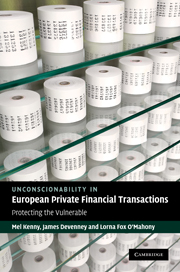Book contents
- Frontmatter
- Contents
- List of contributors
- Introduction: conceptualising unconscionability in Europe
- PART I Conceptualising unconscionability
- PART II Conceptualising unconscionability in financial transactions
- 8 Usury and the judicial regulation of financial transactions in seventeenth- and eighteenth-century England
- 9 Protection of the vulnerable in financial transactions – what the common law vitiating factors can do for you
- 10 Borrowers as consumers: new notions of unconscionability for domestic borrowers
- 11 Conceptualising and understanding fairness: lessons from and for financial services
- 12 Open the box: an exploration of the Financial Services Authority's model of fairness in consumer financial transactions
- 13 Conceptualising unconscionability in the context of risky financial transactions: how to converge public and private law approaches?
- 14 Conceptualising unconscionability in the post-Soviet era: the Lithuanian case of legal transplants
- 15 Bank loan contracts in Polish law: the legal position of the borrower
- 16 Financial contracts and ‘junk title’ purchases: a matter of (in)correct information
- 17 Kickback payments under MiFID: substantive or procedural standard of unconscionability?
- 18 Unfairness under the Consumer Protection from Unfair Trading Regulations 2008
- Conclusions
- Index
- References
9 - Protection of the vulnerable in financial transactions – what the common law vitiating factors can do for you
from PART II - Conceptualising unconscionability in financial transactions
Published online by Cambridge University Press: 06 August 2010
- Frontmatter
- Contents
- List of contributors
- Introduction: conceptualising unconscionability in Europe
- PART I Conceptualising unconscionability
- PART II Conceptualising unconscionability in financial transactions
- 8 Usury and the judicial regulation of financial transactions in seventeenth- and eighteenth-century England
- 9 Protection of the vulnerable in financial transactions – what the common law vitiating factors can do for you
- 10 Borrowers as consumers: new notions of unconscionability for domestic borrowers
- 11 Conceptualising and understanding fairness: lessons from and for financial services
- 12 Open the box: an exploration of the Financial Services Authority's model of fairness in consumer financial transactions
- 13 Conceptualising unconscionability in the context of risky financial transactions: how to converge public and private law approaches?
- 14 Conceptualising unconscionability in the post-Soviet era: the Lithuanian case of legal transplants
- 15 Bank loan contracts in Polish law: the legal position of the borrower
- 16 Financial contracts and ‘junk title’ purchases: a matter of (in)correct information
- 17 Kickback payments under MiFID: substantive or procedural standard of unconscionability?
- 18 Unfairness under the Consumer Protection from Unfair Trading Regulations 2008
- Conclusions
- Index
- References
Summary
Introduction
This collection of essays is concerned with the protection of the vulnerable in financial transactions, and specifically examines the role of unconscionability in those transactions. We should understand ‘financial transactions’ in a broad sense, as any contract involving valuable assets and requiring significant expertise in assessing the wisdom of entering into it. We should understand vulnerability in a broad sense too. A clear picture of this is presented by the Australian doctrine of unconscionable dealing which makes much use of the concept of ‘special disadvantage’, described by Kitto J in Blomley v. Ryan as ‘illness, ignorance, inexperience, impaired faculties, financial need or other circumstances’ that affect a person's ability to conserve their own interests. Unconscionability in this context and other contexts relevant to this chapter consists of taking unfair advantage of vulnerability.
This chapter will examine the grounds upon which the common law may be prepared to rescind or grant other relief to a vulnerable contracting party because of some occurrence in making the contract. These grounds are commonly referred to as ‘vitiating factors’. Five are commonly recognised – mistake, misrepresentation, duress, undue influence, and unconscionable dealing. In turn these can be sub-divided into two classes – mistake and unfair influence. Mistake contains the vitiating factor of ‘mistake’ itself as well as misrepresentation as a form of induced mistake. Unfair influence consists of all the others.
- Type
- Chapter
- Information
- Unconscionability in European Private Financial TransactionsProtecting the Vulnerable, pp. 166 - 183Publisher: Cambridge University PressPrint publication year: 2010



